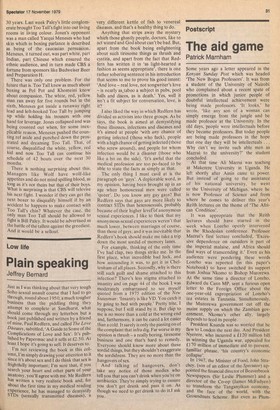Low life
Plain speaking
Jeffrey Bernard
Just as I was thinking about that very tough Soho sexual assault course that I had to go through, round about 1950, a much tougher business than the piddling thing they attempt to complete at Sandhurst, what Should come through my letterbox but a book just published and written by a friend of mine, Paul Redfern, and called The Love Diseases, subtitled, 'A Guide to Some of the Complications of Love and Sex'. It's published by Paperrnac and it sells at £2.50. At Least I hope it's going to sell. It deserves to. I'm not reviewing the book in this column, I'm simply drawing your attention to It since it's about sex and I do think that sex is frightfully important; I'm sure that, if you search your heart and other parts of your anatomy, you'll agree with me. Mr Redfern has written a very realistic book and, for about the first time in my medical reading experience, he has managed to demystify STDs (sexually transmitted diseases), a very different kettle of fish to venereal diseases, and that's a healthy thing to do.
Anything that strips away the mystery which those ghastly people, doctors, like to act wizard and God about can't be bad. But, apart from the book being enlightening about such tiresome things as thrush and cystitis, and apart from the fact that Redfern has written it in 'as light-hearted a fashion as seems appropriate', there is one rather sobering sentence in his introduction that seems to me to prove his good intent: 'And love —real love, not songwriter's love — is nearly as.taboo a subject in pubs, pool halls and discos, as is death.' Yes, well it isn't a fit subject for conversation, love, is it?
I also liked the way in which Redfern has divided us activists into three groups. As he says, the book is aimed at demystifying these illnesses, infections and diseases and it's aimed at people 'with any chance of getting infected (those who fuck), people with a high chance of getting infected (those who screw around), and people for whom infection would be a disaster (those who like a bit on the side). 'It's awful that the medical profession are too po-faced to be able to state the facts as simply as that.
The only thing I must cavil at is the paragraph on 'gays'. A deplorable word, in my opinion, having been brought up in an age when homosexual men were called 'queer'. Do you know any gay gays? But Redfern says that gays are more likely to contract STDs than heterosexuals, probably because of their higher level of anonymous sexual experiences. I like to think that my anonymous sexual experiences weren't that much lower, between marriages of course, than those of gays; and it ,vas inevitable that Redfern's book should make me take a trip down the most sordid of memory lanes.
For example, thinking of the only time I've had clap, two things strike me. In the first place, what incredible bad luck, and how astounding it was, to get it in Cheltenham of all places. Secondly, why is there still such guilt and shame attached to this infection? There's less stigma attached to insanity and on page 44 of the book I was moderately embarrassed to see myself quoted from a 1975 edition of the New Statesman: 'Insanity is like VD. You catch it by going to bed with people.' Pretty trite, I suppose, but I still stand by it. But clap to me is no more than a cold at the wrong end and, furthermore, it can be cured a lot easier than a cold. It surely is only the passing on of the complaint that infra dig. Far worse in my opinion is thrush —a really boring, tiresome business and one that's hard to remedy. Everyone should know more about these sordid things, but they shouldn't exaggerate the sordidness. They are no more than the hangovers of sex. ; And talking of hangovers, don't take any notice of those medics who tell you that you can't drink when you're on antibiotics. 'They're simply trying to ensure YOU don't get drunk and pass it on. As though we need to get drunk to do it.I ask you.






































 Previous page
Previous page